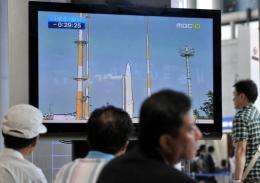SKorea delays rocket launch minutes before blast-off

South Korea Wednesday postponed the launch of its first space rocket just eight minutes before the scheduled blast-off, due to a technical fault.
Mission controllers suspended the launch at 4:52 pm (0752 GMT) and began dumping the rocket's fuel, the science ministry said. It was the seventh time since 2002 that the project, operated in partnership with Russia, has been delayed.
The Korea Space Launch Vehicle-1, which was due to put a satellite into orbit, was reattached to the launch pad.
"There was a problem in the automatic launch sequence that caused the launch to be called off," said Korea Aerospace Research Institute head Lee Joo-Jin, without giving details.
Lee Sang-Mock, a science ministry official in charge of the launch, said a new date would be set after consultation with experts from Russia, which manufactured the rocket's first stage.
There might have been a technical fault in a high-pressure tank, he told reporters, adding it would take several days to solve the problem.
A successful launch would make South Korea the tenth country to put a satellite into orbit using its own rocket.
Seoul has invested 502.5 billion won (419 million dollars) and much national pride in the 33-metre (108-foot) rocket, whose second stage was built by local engineers.
Seoul also built the 100-kilogram (220-pound) scientific research satellite atop the rocket at the Naro Space Centre at Goheung, 475 kilometres (300 miles) south of Seoul.
North Korea, smarting over UN Security Council censure of its own rocket launch in April, had said it would watch closely to see whether world powers also refer the South Korean launch to the Council.
Pyongyang insists it was unfairly punished for its April 5 launch, saying it merely put a peaceful communications satellite into orbit.
Washington and its allies say no satellite was detected in orbit and the North's launch was a disguised test of a Taepodong-2 missile.
Seoul has bristled at any comparisons with its neighbour's operation, insisting its own launch is purely for scientific purposes.
"The South Koreans have developed their programme in a very open and transparent way, and in keeping with the international agreements that they have signed on to," US State Department spokesman Ian Kelly said Tuesday.
"This is in stark contrast to the example set by North Korea, which has not abided by its international agreements."
Washington, concerned about a possible arms race in Northeast Asia, has however sought to restrict South Korea's missile development.
A 2001 accord with the United States bars Seoul from developing missiles with a range of more than 300 kilometres (187 miles).
Science ministry officials have denied Seoul is using Russian technology because Washington refused to transfer the necessary know-how.
However Park Jeong-Joo, director of the Korea Aerospace Research Institute, told journalists in July that Seoul "experienced a lot of difficulties in securing technology cooperation from developed countries".
South Korea has previously sent 10 satellites into space using launch vehicles from other countries.
In November 2007 it announced a plan to launch a lunar orbiter by 2020 and send a probe to the moon five years after that.
South Korea unveiled the project one month after China launched its first lunar orbiter and two months after Japan did the same.
In April last year Seoul sent its first astronaut into space aboard a Russian Soyuz rocket.
(c) 2009 AFP















